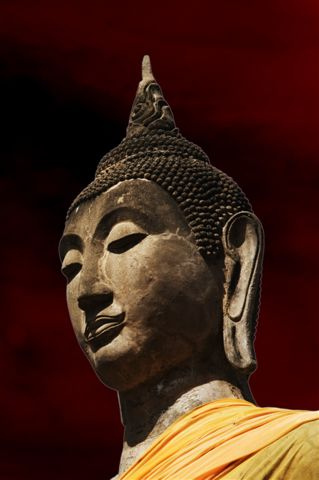“Never let your sense of morals prevent you from doing what’s right.” -Isaac Asimov
Last week a woman emailed me to let me know she holds the copyright for a photo someone submitted for the Life’s Hard Questions contest.
She told me she took the picture of an ex-friend, who we’ll call Tina, using Tina’s camera when they were on vacation, before they had a falling out—and now she wants the photo removed and Tina disqualified from the contest.
She also let me know her computer crashed, so she no longer has the original file. Still, she demanded I take it down or she’d be forced to take further action.
I couldn’t help but feel she reached out to me solely to spite Tina, now that they’re on bad terms. Tina confirmed my hunch when she let me know this ex-friend was harassing her in every possible way on the web.
I asked this woman to send some type of proof that she holds the copyright, but I have to admit a part of me hoped that she could not.
This scenario got me thinking about the speech I heard from Dr. Phil Zombardo, when he talked about what it means to be a hero; a big part of it is speaking out against injustice and not ignoring our instincts when we believe something is not right.
I believe it’s not right to intend to hurt someone—and I always feel compelled to do something when I see someone being mistreated. But I’ve learned that sometimes, even when we believe something is wrong, it’s just not our place to do anything about it.
When two friends are fighting, for example, and it’s tempting to take sides and get involved. But all this does is create more drama.
There are going to be things we feel adamantly are wrong, and sometimes there will be absolutely nothing we can do but offer our support where it’s needed.
Tina’s friend ultimately could not supply proof, so I didn’t need to take the photo down. But if she did, I would have been legally obligated to do just that. Regardless, it wasn’t my friendship to heal.
Sometimes the right thing to do is to let other people make things right.

Photo by nickyfern
About Lori Deschene
Lori Deschene is the founder of Tiny Buddha. She started the site after struggling with depression, bulimia, c-PTSD, and toxic shame so she could recycle her former pain into something useful and inspire others to do the same. You can find her books, including Tiny Buddha’s Gratitude Journal and Tiny Buddha’s Worry Journal, here and learn more about her eCourse, Recreate Your Life Story, if you’re ready to transform your life and become the person you want to be.
- Web |
- More Posts













 Though I run this site, it is not mine. It's ours. It's not about me. It's about us. Your stories and your wisdom are just as meaningful as mine.
Though I run this site, it is not mine. It's ours. It's not about me. It's about us. Your stories and your wisdom are just as meaningful as mine.
It is certainly wise of you not to react in the face of drama, chaos and conflict. The best thing to do is to do nothing at all, until things pend out and with greater clarity. I totally agree with your approach or non-approach. It will be great, however, if the two persons can eventually overcome their differences to become friends once again.
I sure hope they can! I’ve fallen out with friends before, and I know it’s never fun.
Thank you for this great reminder that to mind my own business in situations that don’t directly involve me- for my own safety and sanity as much as anyone elses!
Years ago I put myself in the middle of a very unfortanate crisis occurring within a group of friends. Because I was friends with everyone involved in the crisis, I felt it was my duty as a “good friend” to intervene and influence the friends who were lying to be honest about what was going on. I certainly played a role in the conflict coming to light, but not in the way I hoped.
Despite my good intentions, the effect of my meddling did not change the dishonest behavior, or benefit those being lied to. And the result of my actions was eventually loosing the cherished friendships I had with everyone involved.
What I learned from this situation is I cannot change other people’s behavior, or push someone to repair a relationship they do not wish to repair. I can damage my own reputation, my relationships, and my well being by trying to force an unwanted solution that I felt was right. In the end it doesn’t matter if I was right when everyone ended up unhappy.
The only time it is truly my right to speak up for others is if I witness illegal activity, in which case it is not my responsiblity to correct anyone’s actions, only to report suspected illegal behavior to the appropriate authority.
Though I have learned this lesson painfully, I am appreciative of the reminder to focus on my behavior and behaving honestly and fairly in my own actions, leaving the actions of others alone.
Chrysta
That’s a lesson I have learned as well. I’ve had a long-standing need to try to “fix” things when I think there’s something wrong, especially between two people I care about–and I’ve also lost some friendships for stepping in when it wasn’t my place. But alas, we are now wiser, and I imagine better friends for others because of it. =)
Wisdom in this piece. No doubt. I’d also like to add that I do my best to know that I’m full of BS if for one second I truly believe that I can change anyone. I may have an impact, possibly. But that is all. People can change themselves by doing it themselves. 🙂
You bring up a great point David. We all change when we want to and we’re ready to!
This speaks so strongly to me: “Sometimes the right thing to do is to let other people make things right.” and along with Evelyn’s comment is such a wise reflection. When I work with energy, it is to allow each person to remove barriers and tap fully into flow; sometimes the best gift you can give is the gift of observation as you allow each person to learn how to See at their own pace within their own parameters.
I commend you on your insight, Lori. It’s not always easy to stay neutral and non-defensive when someone trys to pull us into their “stuff”.. I felt irritated while I was reading about this woman’s antics. TinyBuddha is a resource for sharing and inspiration, not a medium f/ petty drama (end rant).
As an aside, someone bought me a copy of your book ‘Tiny Buddha Simple Wisdom..’ f/ Christmas. It’s AWESOME! So much so, that I was more interested in delving into its contents as opposed to focusing my attention on the KindleFire device that I rec’d. too. If you knew how much of a book junkie I am, that’s really saying something 😉
love’n’light
PD
Yes, I felt irritated too–both because it seemed she was trying to spite this ex-friend, and her because her initial email to me also seemed a little hostile. I instinctively feel the need to defend “the underdog” so staying neutral is something I always work at!
Thanks so much for the kind feedback about my book. I’m so glad you enjoyed it! Incidentally, if you would be open to leaving a review on Amazon, I would really appreciate that. =)
What if it was exactly that,abiding,spiting and a lot more,taking all in without replying,since it was the best for her ? Involving others taking more wouldn’t be good too.What a luck finding good people this way though,it may help both.
Another great post Lori. In the past, I had a very strong sense of justice/injustice that I would rail against, until the day came that I began to understand I was keeping injustice alive within me and consequently would get more opportunities for being against something. Today…not so much.
Yes I’ve had that same need for justice! You bring up a great point about keeping injustice alive within you. I know it’s never kind or loving to immediately determine one person is wrong and then “side” against them. It occurred to me in this situation that there is so much I don’t know–and it’s simply not my place to know it.
Dear Lori,
This story reminds me of those social decisions I must make regarding telling friends and associates what I “think.” Sometimes that thinking is about getting insulted, or mistreated, or annoyed (and even emotionally bruised) for a friend’s improper behavior or betrayal.
Sometimes it’s safer to let the incident go and other times it more productive to express my reactions. Sometimes revealing my judgments or “hurt” feeling create positive results, other times they don’t. I have to evaluate each situation. Most of the time however, I choose to communicate my feelings in the kindest way I can by talking about the behavior rather than the person.
But to do that, I have to be emotionally discharged, and that may take time. So it’s a good idea to wait and simmer down before confronting my friends, or wife!
This comment is slightly off-topic, but in the world of managing our people skills, it’s still in the basket.
I’m new to your site and I definitely see it’s benefits! I may not comment much, but I am reading.
Have a joyous coming year, Lori. I appreciate your wisdom.
Irv
Hi Irving,
I know those situations well. I am someone who likes to always express what I think or feel, but I’ve learned that sometimes its best I work through my thoughts/feelings in my head first to ascertain if it’s really worth starting a dialogue about them.
Thanks for saying hello =)
Lori
Well actually you seem to take the side of the submitter of the photo. In terms of copyright law and the DMCA she could probably block the photo if she took that route.
As a publisher in the middle you might have been wise to contact the submitter and grill them as to who the subject & photographer were.
In theory this could result in a copyright lawsuit and you lose a bit of time if called as a witness or for depositions.
And to be fair to other participants in the contest I don’t see how you can impartially judge this photo now. Laws create duties in the real world of media and metaphysics don’t have much sway in a courtroom.
Hi Scott,
I actually contacted the submitter of the photo, and she did not substantiate the other woman’s claim of holding the copyright. She did, however, indicate that woman had been harassing her, so that’s all the information I had to work with.
I know that I tend to side with the person who seems to be the underdog. This situation reminded me to challenge that instinct, because legally speaking, I am obligated to side with the person who holds the copyright–whether that person is being kind or not. If she contacts me again with proof, I will take it down.
As for the contest, the main winners are chosen at random, so there is no judgment from me for them. There is one prize for most creative, but this particular photo wasn’t creative, so it wasn’t in the running for that prize!
Lori
Hi Lori! I came over here to comment as I had similar issues as Scott as to your approach, as I’m a photographer and big on copyright rules (but I’m also still learning the nuances of them).
The problem is that regardless of proof, the copyright is held by the person who pushed the shutter (in the US). If the submitter “Tina” was in the photo, and didn’t use a tripod to take the shot, then she should be the one supplying written proof that she holds the copyright (it was transferred to her) or that she has permission to submit it. If Tina used a tripod and remote/self timer, then she holds the copyright.
Demanding proof from the other woman is not staying out of it. I believe the best way to have done that is to confirm with Tina that she has the rights to submit the photo, and deflecting any requests from the other woman stating that you will only pull it if Tina or a lawyer requests it.
Thanks for this information! I don’t know much about copyright law, so I did a little research to ascertain how I was supposed to handle this.
I originally assumed that I would only take the photo out of the contest if the other woman could prove she holds the copyright–otherwise, anyone who is angry at an old friend could email and say *they* took the picture and want it taken down. The articles I found on Google seemed to confirm that the person needs to supply some type of proof they took the photo, whether it’s a watermark on their website, a time stamp, or whatever.
Ultimately, Tina confirmed that she has the right to submit the photo, and told me to let her friend know she could contact her if she wanted to dispute that.
Thanks again for your advice. =)
Thanks for clarifying!
I don’t know what proof one needs to supply to get a DMCA take down notice, but I know many times it is easy to do without proof (such as if you report an image on Facebook).
Which is why to me, staying out of it still means only listening to a lawyer or legal entity (or if the person who submitted it asks to remove it) – I wouldn’t want the burden or liability of having to figure out if their proof was legitimate or faked. A watermarked version of the photo doesn’t help if it was stolen from online to create it.
If Tina holds the copyright, she should register it immediately with the US copyright office in order to deflect any attempts by the other woman in the future.
It’s a very tricky situation when you hand your camera to another person to take a shot. If they hand it back to you and never download the image themselves, they’ll never have proof they took it and own copyright. And many camera owners will never know copyright law well enough to know who has the rights to that image.
Thanks for the discussion 😀
This was a lesson I learned very painfully when I was newly married. I have tried ever since to never add to any drama.
Where can I find this book in India. I am a regular reader of Evelyn’s blog – abundance tapestry. Got the info from her site. My email id is vxlkz @yahoo.com
Vinay Raj Regards
Hi Vinay~ I will email you now!
I consider this type of behavior ‘stalking’, one step beyong ‘harassment’. By challenging this behavior, you, hopefully, put a stop to it.
Yes, I think so as well. It always breaks my heart to see someone intentionally trying to hurt someone in this way.